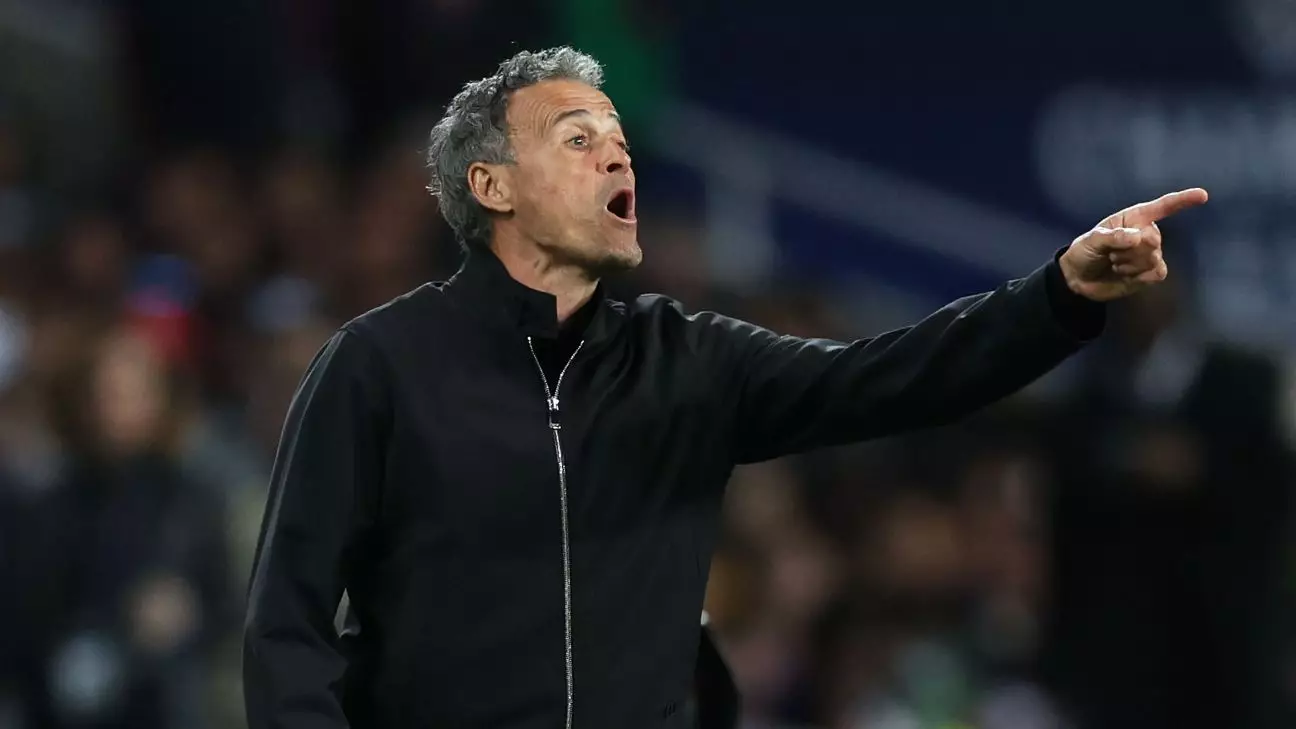The rivalry between clubs is often accompanied by starkly contrasting philosophies, and this sentiment echoes through the words of Paris Saint-Germain (PSG) coach Luis Enrique when speaking about Xavi Hernández’s Barcelona. This theme of criticism and analysis emerges in a revealing documentary that chronicles Enrique’s inaugural season with the French club, where he candidly assesses the state of Barcelona under his former colleague.
At the heart of Enrique’s comments is a radical rethinking of Barcelona’s playing style over recent seasons. Rather than the intricate passing game that once defined the club, Enrique controversially claimed that Barcelona has descended into what he describes as “long ball football,” akin to that played by smaller teams like Eibar. In a notable moment from the documentary, entitled “You have no f—ing idea,” he examines their approach during the Champions League quarterfinals, where PSG faced off against Barcelona. His assertion that Barcelona lacks dominance on the pitch, stating, “They’re not a good team defensively,” raises eyebrows about whether the club is drifting away from its famed possession-based identity.
This analysis sheds light on a broader trend in modern football where teams, even those with storied histories, adapt or compromise their philosophies based on changing dynamics or pressures. So, is this a case of Enrique projecting his own ideals onto Xavi’s new management, or does it reflect a genuine decline in Barcelona’s approach to the game?
Delving deeper into the documentary highlights how Enrique emphasizes the importance of discipline and hard work, particularly spotlighting Kylian Mbappé. His direct confrontation with the young star about the need for leadership and tenacity reveals a critical dimension of Enrique’s coaching philosophy: it’s not merely about talent, but rather the mentality of a player that can both inspire and elevate a team’s performance. By urging Mbappé to embrace a more rigorous pressing style, Enrique demonstrates an understanding that exceptional individual skill must harmonize with team-oriented strategies for success.
In an era where many players prioritize personal rather than collective achievements, this coaching tendency acts as a fulcrum for success. Nonetheless, one wonders if Enrique’s adamancy in pointing out Barcelona’s flaws serves more than one purpose—could this public deconstruction of a fellow coach’s strategies be an attempt to galvanize his own players or, rather, to redirect the pressure towards Xavi during a tense rivalry?
Reflections on Heritage and Expectations
As the documentary unfolds, it is hard to ignore Enrique’s reflections on his previous experiences with Barcelona, a club where he himself achieved significant success. He candidly expresses a wish to avoid pitting teams against his former club, hinting at the emotional weight tied to such encounters. The retrospective also touches on the channels of communication between Enrique and Barcelona, revealing a nuanced insight into how football operates at the managerial level. Questions about potential returns heighten the speculation about loyalty and the inevitable transitions within top-tier football.
In many ways, the documentary serves not only as a chronicle of PSG’s tactical evolution but also a psychological exploration of rivalry, legacy, and the pursuit of excellence. Enrique’s pointed critiques juxtaposed against his own past achievements paint a unique picture of the complexities at play within both clubs.
The Future: Beyond the Rivalry
As the documentary reaches its conclusion, it encapsulates the voice of a manager grappling with the legacy of his past while navigating the challenges of the present. Enrique’s insightful breakdown of Barcelona’s current identity raises broader questions about the future of football strategies. Is there room for growth, or have we entered an era where even the giants must reconsider their approaches?
While Enrique praises players like Mbappé, he sets the stage for necessary changes as PSG adapts to life post-contracts. The need for sustainable success amidst change becomes the overarching theme, pushing both clubs to reflect on their trajectories moving forward.
Ultimately, this documentary not only exposes the layers of rivalry between Enrique’s PSG and Xavi’s Barcelona but also poses a broader question that resonates across the football world: what does it mean to be elite in a constantly shifting landscape? The challenge continues, and as clubs pivot and tacticians emphasize diverse elements of the game, the essence of football remains unchanged—it’s a game of narratives, rivalries, and evolving philosophies.

